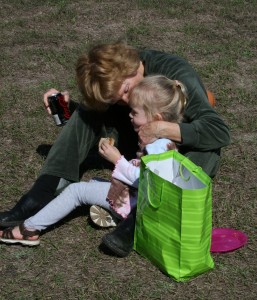 Emerald, my 7th-of-9 grandchildren, will be a one-year-old for only another month or so. Her cousin Andrew from England (#8) will be one for 8 more months. In the general scheme of things, both are relatively new walkers, and watching them get around is comedic entertainment.
Emerald, my 7th-of-9 grandchildren, will be a one-year-old for only another month or so. Her cousin Andrew from England (#8) will be one for 8 more months. In the general scheme of things, both are relatively new walkers, and watching them get around is comedic entertainment.
A walk around the block is an athletic event for a new walker, and both Emerald and Andrew still lead with their tummies, shoulders back, arms out to the side for balance. It’s a charming, brief stage of life.
 When a baby is learning to walk, he falls down continually, though he eventually develops a toddle and falls less often. Still, it doesn’t take much to throw him to the ground. But for all one-year-olds, popping up without damage is the usual outcome of a fall.
When a baby is learning to walk, he falls down continually, though he eventually develops a toddle and falls less often. Still, it doesn’t take much to throw him to the ground. But for all one-year-olds, popping up without damage is the usual outcome of a fall.
A school child who falls doesn’t pop up as readily. Tears flow, and there might be a need for a cartoon-enhanced Band-Aid. But he, too, heals quickly and forgets his tumble in a hurry.
By the time we’re adults, falls are nearly non-existent. We’ve become good on our feet and sure of our step. If we do go down, it’s quite a crash, and before we get up, we pause to see if we’re hurt. Often it’s 24 hours later that we “see” what we really did through stiff muscles and fresh bruises.
The other day I took a fall of my own after tripping over a lamp cord. No harm was done, and I was glad no one saw me, but it made me decide I didn’t want to fall again. A broken bone, common at my age, would be less than convenient, and I’m making an effort to walk carefully, not carelessly.
If we live long enough, however, none of us will be walking. Old folk’s homes make good use of wheelchairs, and as the Bible says, aged people are sometimes taken places they don’t want to go. That’s because they can’t walk in the other direction.
When that time comes, our walking will have to be done in another realm, the realm of faith. Scripture tells us it’s best to walk by faith in God rather than by sight. The verse implies we ought to be faith-walking throughout life, not just in old age, depending on God’s guidance rather than on what we see.
When we’re able-bodied, walking through life without many physical falls, it’s easier to fall spiritually and not know it. But when we’re in a bed or wheelchair, faith-walking comes more readily. Maybe that’s the best kept secret of old age.

 Meanwhile, I’m seeing two little one-year-olds walking with enthusiasm and managing life completely by sight, not by faith. But that’s ok for now, because once in a while they walk right into the arms of a grateful grandma.
Meanwhile, I’m seeing two little one-year-olds walking with enthusiasm and managing life completely by sight, not by faith. But that’s ok for now, because once in a while they walk right into the arms of a grateful grandma.
“We walk by faith, not by sight.” (2 Corinthians 5:7)
Praying and Praising with Mary
- I’m praising the Lord that medical personnel found a good vein during Monday’s infusion.
- I’m also thankful I have only 3 infusions left (out of 18 total).




